Reflective Account: Group Presentation on Marketing Mix and Teamwork
VerifiedAdded on 2020/07/23
|8
|1670
|23
Journal and Reflective Writing
AI Summary
This reflective writing piece offers an in-depth analysis of a student's experience with a group presentation on market analysis and marketing mix, focusing on a new or improved product or service. The student utilizes Tuckman's theory of team development (forming, storming, norming, performing, and adjourning) to reflect on the team's dynamics, challenges, and successes. The account details the assignment of roles, initial team formation, conflicts during the storming phase, the development of teamwork during the norming phase, and the challenges faced during the presentation itself. The student reflects on personal strengths and weaknesses, particularly related to public speaking, and identifies areas for future improvement. The reflection highlights the importance of communication, collaboration, and individual contributions within a team setting to achieve a successful outcome.

Reflective writing
Paraphrase This Document
Need a fresh take? Get an instant paraphrase of this document with our AI Paraphraser
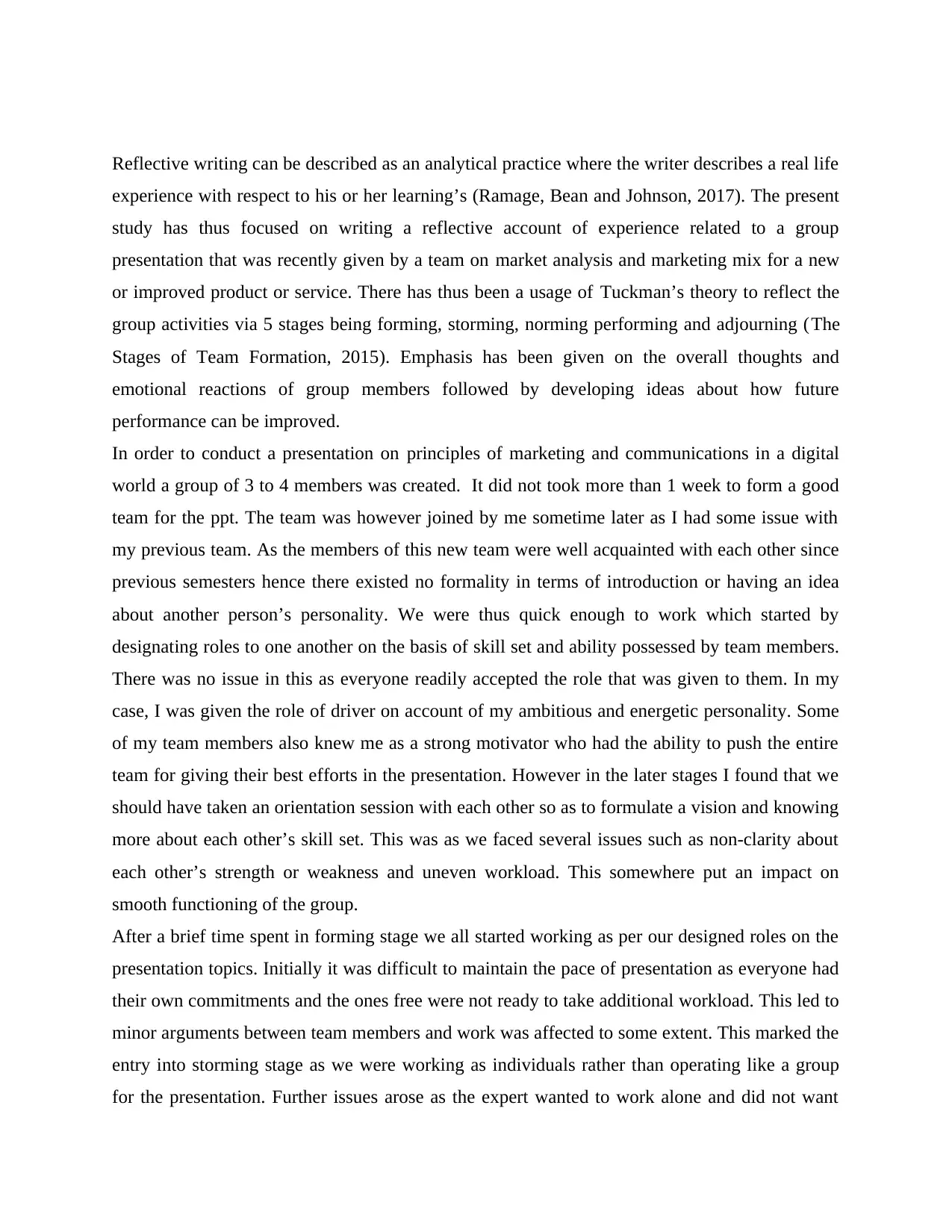
Reflective writing can be described as an analytical practice where the writer describes a real life
experience with respect to his or her learning’s (Ramage, Bean and Johnson, 2017). The present
study has thus focused on writing a reflective account of experience related to a group
presentation that was recently given by a team on market analysis and marketing mix for a new
or improved product or service. There has thus been a usage of Tuckman’s theory to reflect the
group activities via 5 stages being forming, storming, norming performing and adjourning (The
Stages of Team Formation, 2015). Emphasis has been given on the overall thoughts and
emotional reactions of group members followed by developing ideas about how future
performance can be improved.
In order to conduct a presentation on principles of marketing and communications in a digital
world a group of 3 to 4 members was created. It did not took more than 1 week to form a good
team for the ppt. The team was however joined by me sometime later as I had some issue with
my previous team. As the members of this new team were well acquainted with each other since
previous semesters hence there existed no formality in terms of introduction or having an idea
about another person’s personality. We were thus quick enough to work which started by
designating roles to one another on the basis of skill set and ability possessed by team members.
There was no issue in this as everyone readily accepted the role that was given to them. In my
case, I was given the role of driver on account of my ambitious and energetic personality. Some
of my team members also knew me as a strong motivator who had the ability to push the entire
team for giving their best efforts in the presentation. However in the later stages I found that we
should have taken an orientation session with each other so as to formulate a vision and knowing
more about each other’s skill set. This was as we faced several issues such as non-clarity about
each other’s strength or weakness and uneven workload. This somewhere put an impact on
smooth functioning of the group.
After a brief time spent in forming stage we all started working as per our designed roles on the
presentation topics. Initially it was difficult to maintain the pace of presentation as everyone had
their own commitments and the ones free were not ready to take additional workload. This led to
minor arguments between team members and work was affected to some extent. This marked the
entry into storming stage as we were working as individuals rather than operating like a group
for the presentation. Further issues arose as the expert wanted to work alone and did not want
experience with respect to his or her learning’s (Ramage, Bean and Johnson, 2017). The present
study has thus focused on writing a reflective account of experience related to a group
presentation that was recently given by a team on market analysis and marketing mix for a new
or improved product or service. There has thus been a usage of Tuckman’s theory to reflect the
group activities via 5 stages being forming, storming, norming performing and adjourning (The
Stages of Team Formation, 2015). Emphasis has been given on the overall thoughts and
emotional reactions of group members followed by developing ideas about how future
performance can be improved.
In order to conduct a presentation on principles of marketing and communications in a digital
world a group of 3 to 4 members was created. It did not took more than 1 week to form a good
team for the ppt. The team was however joined by me sometime later as I had some issue with
my previous team. As the members of this new team were well acquainted with each other since
previous semesters hence there existed no formality in terms of introduction or having an idea
about another person’s personality. We were thus quick enough to work which started by
designating roles to one another on the basis of skill set and ability possessed by team members.
There was no issue in this as everyone readily accepted the role that was given to them. In my
case, I was given the role of driver on account of my ambitious and energetic personality. Some
of my team members also knew me as a strong motivator who had the ability to push the entire
team for giving their best efforts in the presentation. However in the later stages I found that we
should have taken an orientation session with each other so as to formulate a vision and knowing
more about each other’s skill set. This was as we faced several issues such as non-clarity about
each other’s strength or weakness and uneven workload. This somewhere put an impact on
smooth functioning of the group.
After a brief time spent in forming stage we all started working as per our designed roles on the
presentation topics. Initially it was difficult to maintain the pace of presentation as everyone had
their own commitments and the ones free were not ready to take additional workload. This led to
minor arguments between team members and work was affected to some extent. This marked the
entry into storming stage as we were working as individuals rather than operating like a group
for the presentation. Further issues arose as the expert wanted to work alone and did not want
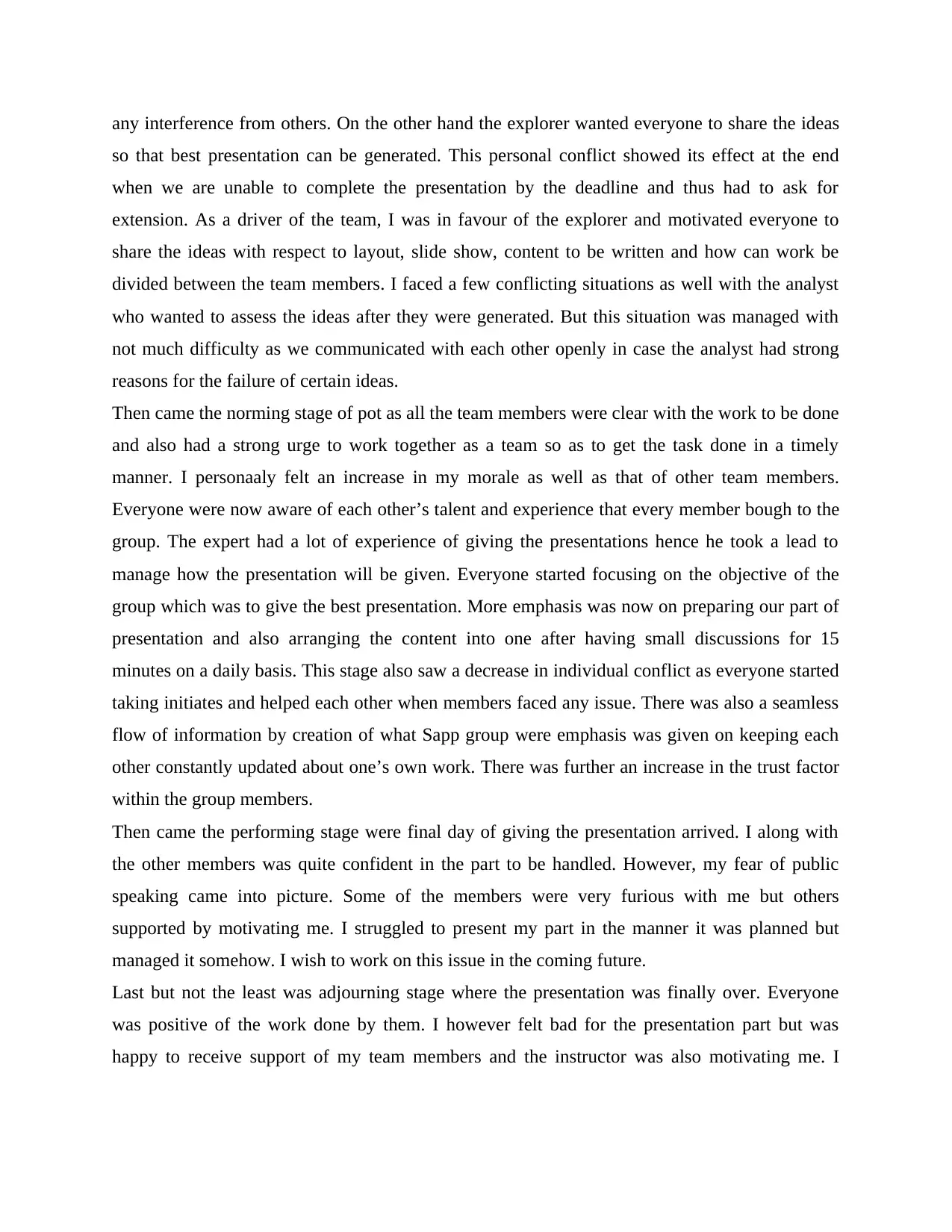
any interference from others. On the other hand the explorer wanted everyone to share the ideas
so that best presentation can be generated. This personal conflict showed its effect at the end
when we are unable to complete the presentation by the deadline and thus had to ask for
extension. As a driver of the team, I was in favour of the explorer and motivated everyone to
share the ideas with respect to layout, slide show, content to be written and how can work be
divided between the team members. I faced a few conflicting situations as well with the analyst
who wanted to assess the ideas after they were generated. But this situation was managed with
not much difficulty as we communicated with each other openly in case the analyst had strong
reasons for the failure of certain ideas.
Then came the norming stage of pot as all the team members were clear with the work to be done
and also had a strong urge to work together as a team so as to get the task done in a timely
manner. I personaaly felt an increase in my morale as well as that of other team members.
Everyone were now aware of each other’s talent and experience that every member bough to the
group. The expert had a lot of experience of giving the presentations hence he took a lead to
manage how the presentation will be given. Everyone started focusing on the objective of the
group which was to give the best presentation. More emphasis was now on preparing our part of
presentation and also arranging the content into one after having small discussions for 15
minutes on a daily basis. This stage also saw a decrease in individual conflict as everyone started
taking initiates and helped each other when members faced any issue. There was also a seamless
flow of information by creation of what Sapp group were emphasis was given on keeping each
other constantly updated about one’s own work. There was further an increase in the trust factor
within the group members.
Then came the performing stage were final day of giving the presentation arrived. I along with
the other members was quite confident in the part to be handled. However, my fear of public
speaking came into picture. Some of the members were very furious with me but others
supported by motivating me. I struggled to present my part in the manner it was planned but
managed it somehow. I wish to work on this issue in the coming future.
Last but not the least was adjourning stage where the presentation was finally over. Everyone
was positive of the work done by them. I however felt bad for the presentation part but was
happy to receive support of my team members and the instructor was also motivating me. I
so that best presentation can be generated. This personal conflict showed its effect at the end
when we are unable to complete the presentation by the deadline and thus had to ask for
extension. As a driver of the team, I was in favour of the explorer and motivated everyone to
share the ideas with respect to layout, slide show, content to be written and how can work be
divided between the team members. I faced a few conflicting situations as well with the analyst
who wanted to assess the ideas after they were generated. But this situation was managed with
not much difficulty as we communicated with each other openly in case the analyst had strong
reasons for the failure of certain ideas.
Then came the norming stage of pot as all the team members were clear with the work to be done
and also had a strong urge to work together as a team so as to get the task done in a timely
manner. I personaaly felt an increase in my morale as well as that of other team members.
Everyone were now aware of each other’s talent and experience that every member bough to the
group. The expert had a lot of experience of giving the presentations hence he took a lead to
manage how the presentation will be given. Everyone started focusing on the objective of the
group which was to give the best presentation. More emphasis was now on preparing our part of
presentation and also arranging the content into one after having small discussions for 15
minutes on a daily basis. This stage also saw a decrease in individual conflict as everyone started
taking initiates and helped each other when members faced any issue. There was also a seamless
flow of information by creation of what Sapp group were emphasis was given on keeping each
other constantly updated about one’s own work. There was further an increase in the trust factor
within the group members.
Then came the performing stage were final day of giving the presentation arrived. I along with
the other members was quite confident in the part to be handled. However, my fear of public
speaking came into picture. Some of the members were very furious with me but others
supported by motivating me. I struggled to present my part in the manner it was planned but
managed it somehow. I wish to work on this issue in the coming future.
Last but not the least was adjourning stage where the presentation was finally over. Everyone
was positive of the work done by them. I however felt bad for the presentation part but was
happy to receive support of my team members and the instructor was also motivating me. I
⊘ This is a preview!⊘
Do you want full access?
Subscribe today to unlock all pages.

Trusted by 1+ million students worldwide

somewhere felt quite heavy to move away from the team members as we had developed close
bonding with each other. It was a bad feeling that the experience was finally over.
bonding with each other. It was a bad feeling that the experience was finally over.
Paraphrase This Document
Need a fresh take? Get an instant paraphrase of this document with our AI Paraphraser

References
Ramage, J.D., Bean, J.C. and Johnson, J., 2017. The Allyn & Bacon guide to writing. Pearson.
The Stages of Team Formation. 2015. [Online]. Available through:
<http://www.ventureteambuilding.co.uk/forming-storming-norming-performing///>
[Accessed on 23rd April 2018].
Ramage, J.D., Bean, J.C. and Johnson, J., 2017. The Allyn & Bacon guide to writing. Pearson.
The Stages of Team Formation. 2015. [Online]. Available through:
<http://www.ventureteambuilding.co.uk/forming-storming-norming-performing///>
[Accessed on 23rd April 2018].
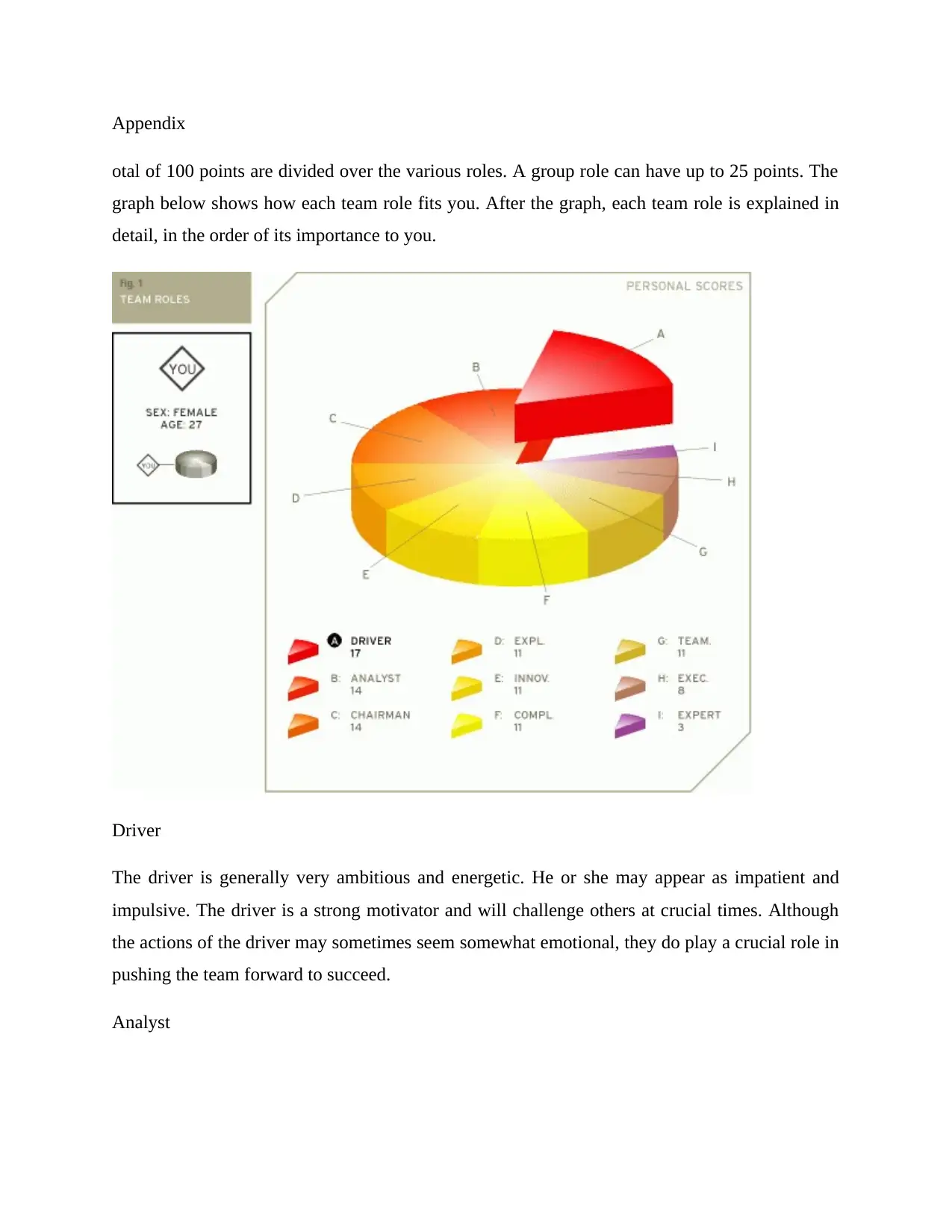
Appendix
otal of 100 points are divided over the various roles. A group role can have up to 25 points. The
graph below shows how each team role fits you. After the graph, each team role is explained in
detail, in the order of its importance to you.
Driver
The driver is generally very ambitious and energetic. He or she may appear as impatient and
impulsive. The driver is a strong motivator and will challenge others at crucial times. Although
the actions of the driver may sometimes seem somewhat emotional, they do play a crucial role in
pushing the team forward to succeed.
Analyst
otal of 100 points are divided over the various roles. A group role can have up to 25 points. The
graph below shows how each team role fits you. After the graph, each team role is explained in
detail, in the order of its importance to you.
Driver
The driver is generally very ambitious and energetic. He or she may appear as impatient and
impulsive. The driver is a strong motivator and will challenge others at crucial times. Although
the actions of the driver may sometimes seem somewhat emotional, they do play a crucial role in
pushing the team forward to succeed.
Analyst
⊘ This is a preview!⊘
Do you want full access?
Subscribe today to unlock all pages.

Trusted by 1+ million students worldwide
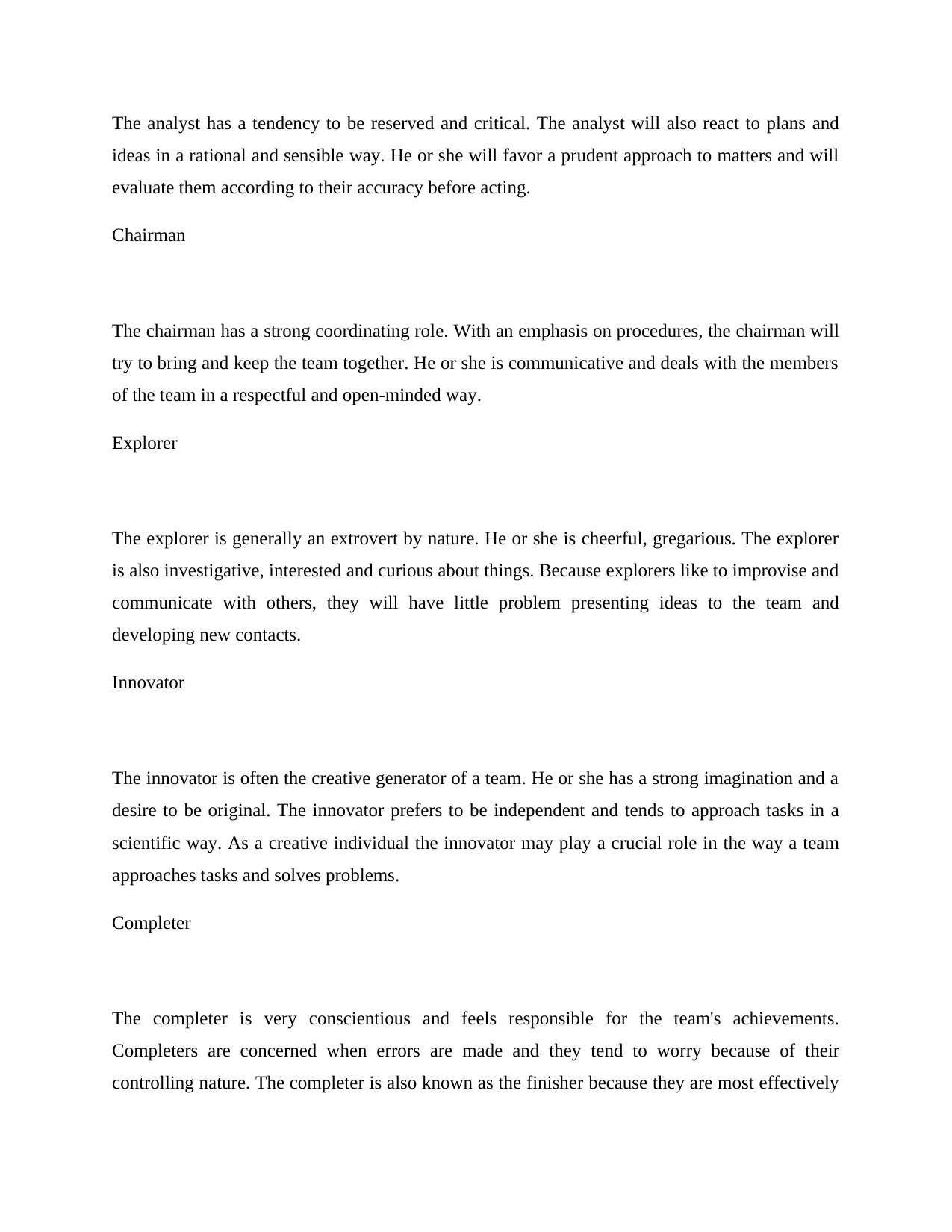
The analyst has a tendency to be reserved and critical. The analyst will also react to plans and
ideas in a rational and sensible way. He or she will favor a prudent approach to matters and will
evaluate them according to their accuracy before acting.
Chairman
The chairman has a strong coordinating role. With an emphasis on procedures, the chairman will
try to bring and keep the team together. He or she is communicative and deals with the members
of the team in a respectful and open-minded way.
Explorer
The explorer is generally an extrovert by nature. He or she is cheerful, gregarious. The explorer
is also investigative, interested and curious about things. Because explorers like to improvise and
communicate with others, they will have little problem presenting ideas to the team and
developing new contacts.
Innovator
The innovator is often the creative generator of a team. He or she has a strong imagination and a
desire to be original. The innovator prefers to be independent and tends to approach tasks in a
scientific way. As a creative individual the innovator may play a crucial role in the way a team
approaches tasks and solves problems.
Completer
The completer is very conscientious and feels responsible for the team's achievements.
Completers are concerned when errors are made and they tend to worry because of their
controlling nature. The completer is also known as the finisher because they are most effectively
ideas in a rational and sensible way. He or she will favor a prudent approach to matters and will
evaluate them according to their accuracy before acting.
Chairman
The chairman has a strong coordinating role. With an emphasis on procedures, the chairman will
try to bring and keep the team together. He or she is communicative and deals with the members
of the team in a respectful and open-minded way.
Explorer
The explorer is generally an extrovert by nature. He or she is cheerful, gregarious. The explorer
is also investigative, interested and curious about things. Because explorers like to improvise and
communicate with others, they will have little problem presenting ideas to the team and
developing new contacts.
Innovator
The innovator is often the creative generator of a team. He or she has a strong imagination and a
desire to be original. The innovator prefers to be independent and tends to approach tasks in a
scientific way. As a creative individual the innovator may play a crucial role in the way a team
approaches tasks and solves problems.
Completer
The completer is very conscientious and feels responsible for the team's achievements.
Completers are concerned when errors are made and they tend to worry because of their
controlling nature. The completer is also known as the finisher because they are most effectively
Paraphrase This Document
Need a fresh take? Get an instant paraphrase of this document with our AI Paraphraser
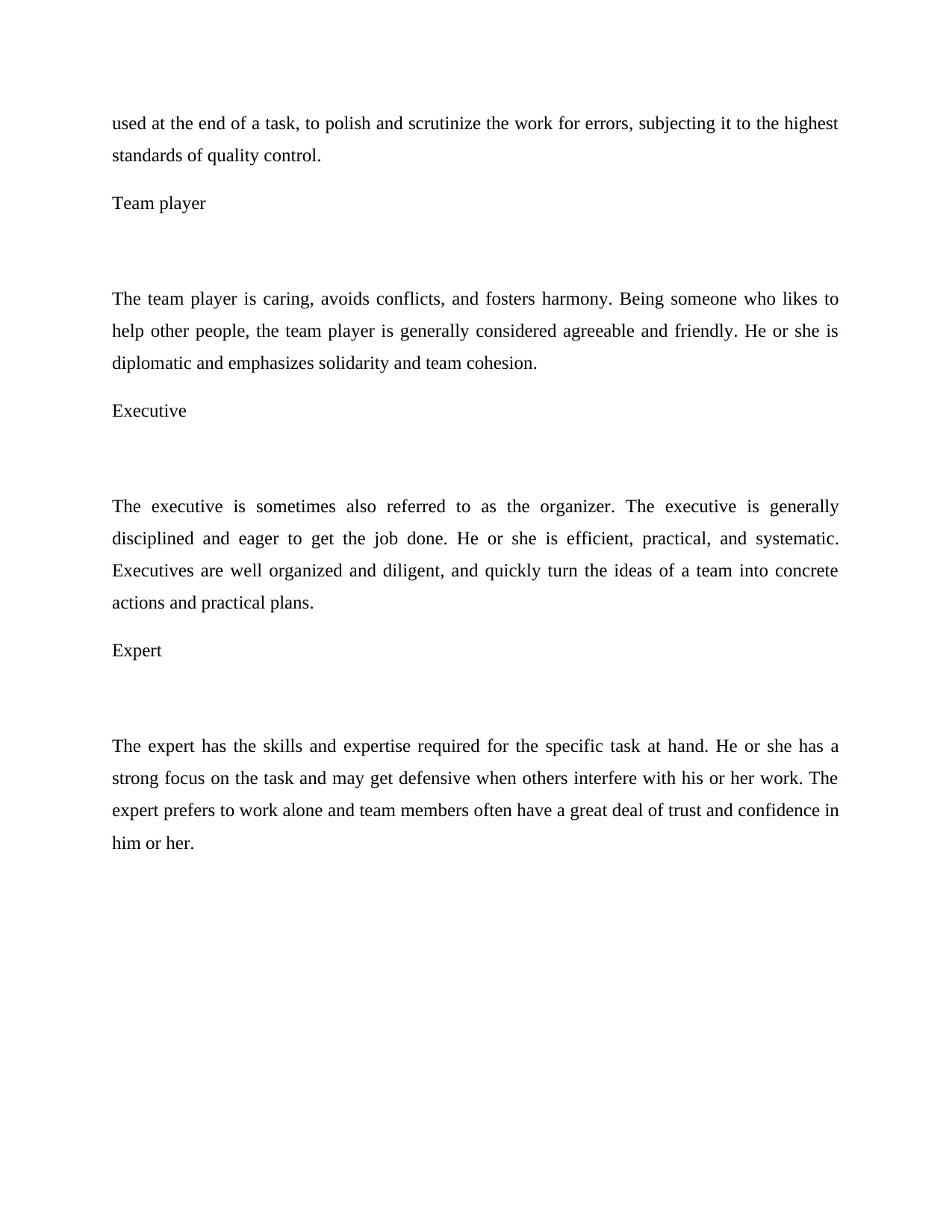
used at the end of a task, to polish and scrutinize the work for errors, subjecting it to the highest
standards of quality control.
Team player
The team player is caring, avoids conflicts, and fosters harmony. Being someone who likes to
help other people, the team player is generally considered agreeable and friendly. He or she is
diplomatic and emphasizes solidarity and team cohesion.
Executive
The executive is sometimes also referred to as the organizer. The executive is generally
disciplined and eager to get the job done. He or she is efficient, practical, and systematic.
Executives are well organized and diligent, and quickly turn the ideas of a team into concrete
actions and practical plans.
Expert
The expert has the skills and expertise required for the specific task at hand. He or she has a
strong focus on the task and may get defensive when others interfere with his or her work. The
expert prefers to work alone and team members often have a great deal of trust and confidence in
him or her.
standards of quality control.
Team player
The team player is caring, avoids conflicts, and fosters harmony. Being someone who likes to
help other people, the team player is generally considered agreeable and friendly. He or she is
diplomatic and emphasizes solidarity and team cohesion.
Executive
The executive is sometimes also referred to as the organizer. The executive is generally
disciplined and eager to get the job done. He or she is efficient, practical, and systematic.
Executives are well organized and diligent, and quickly turn the ideas of a team into concrete
actions and practical plans.
Expert
The expert has the skills and expertise required for the specific task at hand. He or she has a
strong focus on the task and may get defensive when others interfere with his or her work. The
expert prefers to work alone and team members often have a great deal of trust and confidence in
him or her.
1 out of 8
Related Documents
Your All-in-One AI-Powered Toolkit for Academic Success.
+13062052269
info@desklib.com
Available 24*7 on WhatsApp / Email
![[object Object]](/_next/static/media/star-bottom.7253800d.svg)
Unlock your academic potential
Copyright © 2020–2026 A2Z Services. All Rights Reserved. Developed and managed by ZUCOL.





